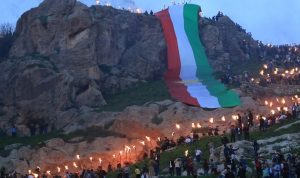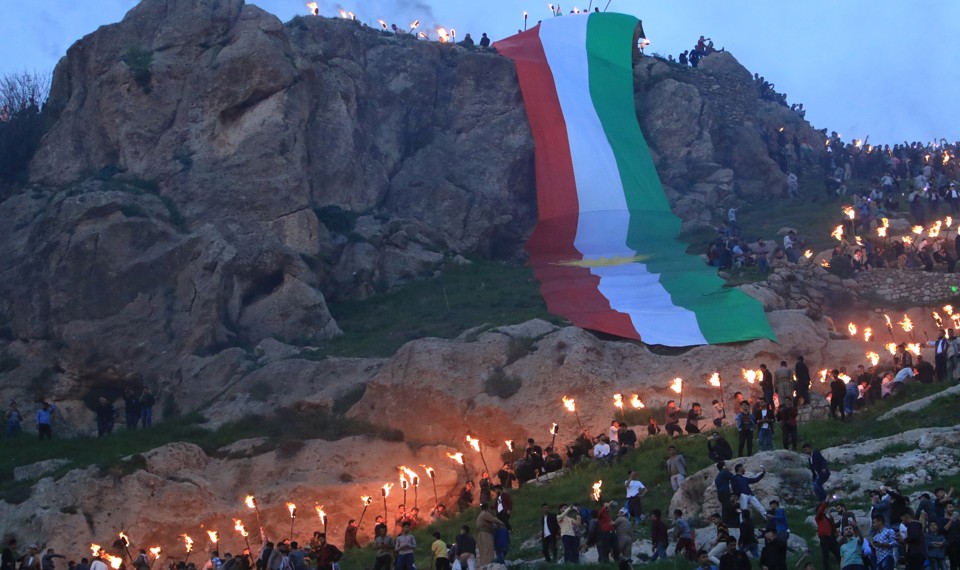Fifteen years after the Iraq war, they’re redrawing the map of the region—much to the displeasure of surrounding powers.
 The Atlantic
The Atlantic

That moment was believed to mark the first time a modern Iraqi leader has spoken in Kurdish, which, along with Arabic, is an official language of Iraq. And he accompanied that with a more substantive overture, agreeing to transfer more than $250 million to the Kurdish Regional Government to help pay the salaries Kurdish government workers and security forces.
The remarks coincide with the 15th anniversary of the U.S.-led invasion of Iraq. The repercussions of that conflict are still being felt in Iraq and the broader Middle East. One legacy of the war is the way Kurds are reshaping the region—often to the consternation of surrounding powers.
Indeed Abadi’s actions represented a departure from months of tensions between Iraq and the KRG that have been years in the making. The strains were exacerbated by last fall’s independence referendum in Iraqi Kurdistan. The Kurds, apparently emboldened by their military success against ISIS, and buoyed after having taken possession in 2014 of Kirkuk, the oil-rich region that is among the main areas of dispute between Baghdad and Irbil, called for the vote—despite strong urging from their U.S. allies not to do so. That successful independence referendum was followed by Iraqi forces retaking Kirkuk, resulting in the loss of face for the the Kurds, as well revenue from the oil fields there. This week’s gesture by Abadi should assuage some of the KRG’s monetary concerns. (The KRG is highly dependent on oil revenue.)
Although the Iraqi Kurds made some progress this week, their brethren across the border in Syria aren’t having a good week. Here, too, the Kurds were a long neglected and long oppressed minority. Here, too, they were among the most effective fighting forces against ISIS. Here, too, they carved out their own enclave—this time in northern Syria. But last weekend, Turkish forces succeeded in retaking Afrin, the Kurdish-controlled Syrian town near the border with Turkey. The Turks, who have their own restive Kurdish population, want the Syrian Kurds to withdraw to the east of the Euphrates River—and are now threatening the town of Manbij, also west of the Euphrates and under Kurdish control. Some Syrian Kurds have links to the Kurdistan Workers Party, or PKK, a separatist Kurdish group that operates inside Turkey, and which Ankara (as well as Washington) regards as a terrorist organization. Some are also supported by the U.S. (For more on the many overlapping alliances and conflicts inside Syria, go here.)
Turkey’s capture of the Kurdish-controlled town of Afrin in Syria illustrates a problem perhaps unique to the Kurds, possibly the most politically successful people without a state. The more politically and militarily successful the Kurds are, the greater their prospects of being crushed by one of the many powers that fear a successful breakaway Kurdish state. And yet, with each of those political gains, followed by the inevitable regional backlash, the Kurds also alter, perhaps irreversibly, the de facto map of the region.
“When it comes to the Kurds, it’s been two steps forward, but it’s going to be one step back,” Michael Rubin, a resident scholar at the American Enterprise Institute who studies the region, told me. “They’re not going to keep the maximum gain that they had achieved, but it’s impossible to go back to their pre-war position.”
Rubin was referring to the seven-year-old Syrian conflict, which has allowed the Kurds to carve their own autonomous region in the north of the country. But his analysis can also be applied to Iraq, where the Kurds have enjoyed broad autonomy since the early 1990s thanks to the no-fly zones maintained by the U.S., U.K., and France—and supported by Turkey—to protect them from Saddam Hussein’s air force. From this period until the U.S.-led invasion of Iraq 15 years ago, Iraqi Kurds enjoyed de facto independence. After Saddam’s ouster, they were reconnected with the government in Baghdad, but continued to enjoy broad autonomy under Iraq’s new constitution. They developed oil fields, built out autonomous institutions, and became a federal region. But their ambitions, including the taking of Kirkuk, and the independence referendum resulted in last fall’s tensions with Baghdad and Tehran, another regional power that opposes an independent Iraqi Kurdistan. The gains in the Syrian Kurdish enclave, known as Rojava, has caused similar concerns in Turkey.
“It’s fine to want to be independent. People have their right to self-determination … so it’s not an issue of right or wrong,” Hiltermann told me. “The question was did they have the capacity and was the timing right? And clearly they didn’t have the capacity and the timing was terrible.”
Still, the Kurds are among the few regional success stories—as both Hiltermann and Rubin pointed out. Their enclaves provide public services as well as security; their societies enjoy relative gender parity as well as religious tolerance. But they are by no means Western-style democracies. Corruption remains a problem, as is the encouragement of personality cults—whether among Kurds in Iraq or Turkey or Syria.
As Hiltermann said of Iraqi Kurdistan: “Do you call it Western-style democracy? Absolutely not. Do you call it better than before? Yeah, probably. It was an improvement.” His assessment of the Kurdish enclave in Syria was similar: “Is it democratic? No. Does it function? Yes, up to a point. And in an area that was neglected by the Syrian regime, since forever, that’s an improvement.”
For the time being at least, this de facto self-governance is perhaps the best Kurds in the region can hope for. The U.S. maintains it does not support Kurdish independence in Iraq. It urged Turkey to respect the Syrian ceasefire in Afrin, but appeared to do little to stop Turkish forces from pushing Kurds out of the town. Russia, which controls the region west of the Euphrates, and so had permitted the Kurdish occupation of Afrin, also did little to prevent the Turks from crossing the border. Ultimately, as the tensions over Kurdish actions recede, the region may well return to a point where, as Rubin, the scholar at AEI, put it, the regional powers, especially Turkey, adopt a more pragmatic approach to the Kurds.
“Just as with the United States, the Arab and Turkish position [on Kurds] lacks consistency,” he said. “Back … in 2000, the Turks were implacable enemies (of Iraqi Kurdistan), and basically wanted to boycott and isolate the Kurds. Now, they are business partners. With time comes the recognition of reality.”
ABOUT THE AUTHOR
https://www.theatlantic.com/international/archive/2018/03/kurds-iraq-syria/556052/




